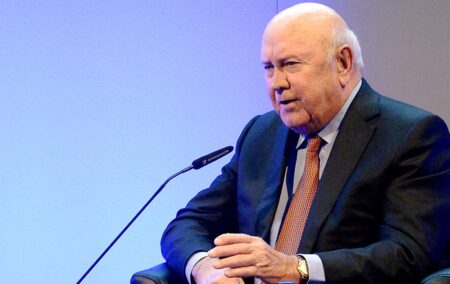Among the many awards FW de Klerk received was one for political courage. It was probably the most appropriate of them all, and one that few political leaders deserve.
Mr de Klerk was not the first Afrikaner and National Party (NP) leader to embark upon the dismantling of the apartheid system. John Vorster started the process in 1967 when he announced that a New Zealand rugby team touring South Africa could include Maoris. He later started to liberalise labour law. His successor, PW Botha, conceded trade-union rights to black African workers in 1979 and repealed the pass laws in 1986.
Repression
This process of liberalisation was, however, accompanied by repressive measures, among them longer periods of detention without trial, torture and deaths in detention, and the bannings of more black political organisations, as well as newspapers. Two or three million people were forcibly removed from the supposedly “white” part of the country into the ten black “homelands”. Millions of black Africans lost their South African citizenship as four of the ten homelands became constitutionally separate.
But in the mid-1980s Mr Botha recognised that this policy of political segregation, forced removal, and citizenship deprivation had come to the end of the road. Black Africans had somehow to be incorporated into the same political institutions as the white, coloured, and Asian/Indian minorities.
This necessitated negotiation. The most powerful black leader within the country was Mangosuthu Buthelezi, but he had always refused to enter any national constitutional talks unless banned organisations and imprisoned leaders had the same opportunity. So Mr Botha opened secret talks with Nelson Mandela.
The next logical step in this process had to be political liberalisation. Decades of repressive policies had to be reversed. Lifting bans and freeing political prisoners meant liberating organisations and people long committed to the use of revolutionary violence, many of them communists or heavily under communist influence.
People’s War
In the meantime, the African National Congress (ANC) had launched its “peoples’ war” to make the country ungovernable and eliminate its political rivals. The Botha government’s attempts to restore stability, not least by declaring states of emergency, sometimes made things worse, which was exactly what the revolutionaries wanted. The more sjambokkings and shootings by the police that could be shown on television screens across the world, the better. International pressures, dating back to the 1960s, were intensifying.
This was the situation that confronted Mr de Klerk when he became state president in September 1989. He did not dither, for only a few months later he delivered his momentous speech of 2nd February 1990. The bans on the ANC and the South African Communist Party and other organisations were lifted. Mr Mandela and others were released.
This was a risk, a gamble, a leap into the unknown. Arguably, Mr de Klerk had little choice. His actions nevertheless required immense political courage, for which he has probably received more accolades abroad than he has in his own country.
Bravery
Mr de Klerk’s brave statesmanship enabled him to seize the political initiative and also the moral high ground. He therefore had to be weakened, to which purpose the ANC launched a brilliant propaganda campaign which blamed him for the intensified violence which followed his actions of 2nd February and for which Mr Mandela had himself called in his very first public speech after his release. Mr Mandela’s call for intensified violence, repeatedly echoed by his followers, did not stop him from sending into the world the lie that it was all the fault of Mr de Klerk.
Given all the violence, South Africa’s first universal-franchise election at the end of April 1994 was remarkably peaceful. But the country was stampeded into it by the ANC’s entirely credible threat that it would continue to wage its people’s war until it got its way.
Very soon after Mr de Klerk came to power, the Berlin Wall collapsed. When Mr de Klerk made his famous speech he said 1989 would go down in history as the year in which Stalinist communism expired. The collapse of communism, he later said, had pulled the carpet from under the ANC. “It was as if God had commanded a turnabout in world history. We had to seize the opportunity.”
Commitment to the NDR
How wrong he was, not in seizing the opportunity, but about the carpet having been pulled from under the ANC. That organisation is still dominated by communists. It remains committed via formal resolution to implementing a national democratic revolution, which is a blueprint for turning South Africa into a communist state.
Jan Smuts, principal architect of the first South African constitution, which entrenched white minority rule from the very day on which the Union of South African came into being in 1910, shrank from any effort to extend political rights to blacks. He dumped the burden upon his successors, whose repressive policies ensured that communists gained more and more influence in the ANC. It fell to Mr de Klerk to deal with politicians very much more ruthless than those with whom General Smuts had to deal. This underlines his courage in undertaking the risk he did.
Since retiring from active politics, Mr de Klerk and his foundation have spent plenty of energy combating the ideology of the national democratic revolution. The vast majority of the commentariat still ignore it, as they do the murderous strategy of the people’s war. Mr de Klerk kept fighting as long as he could to defend constitutional government against revolutionary ideology.
If you like what you have just read, support the Daily Friend

